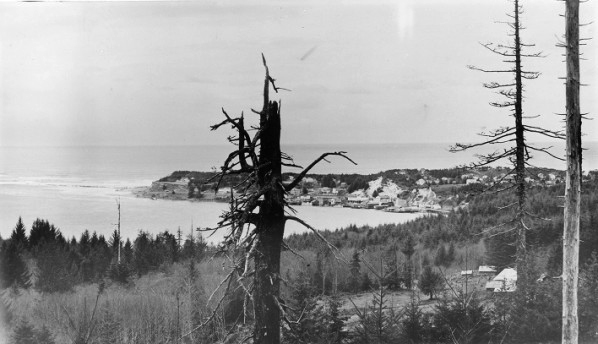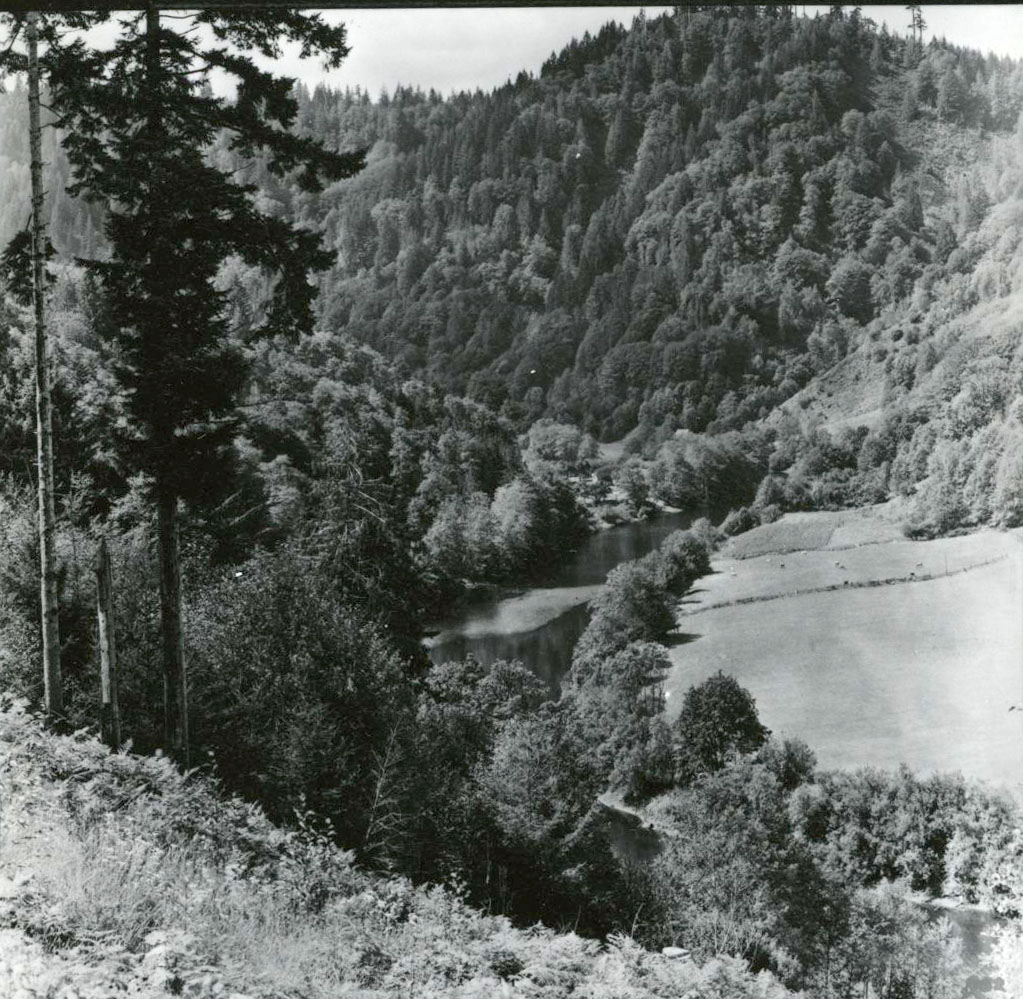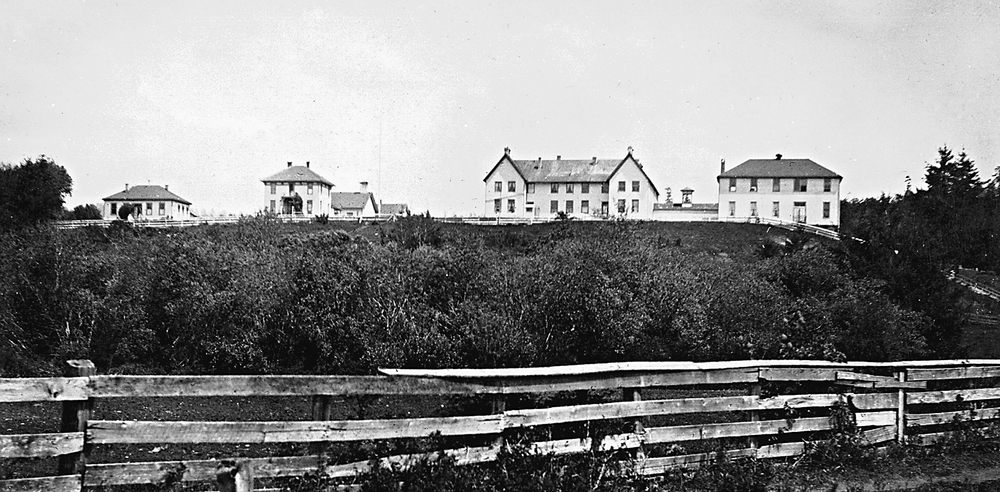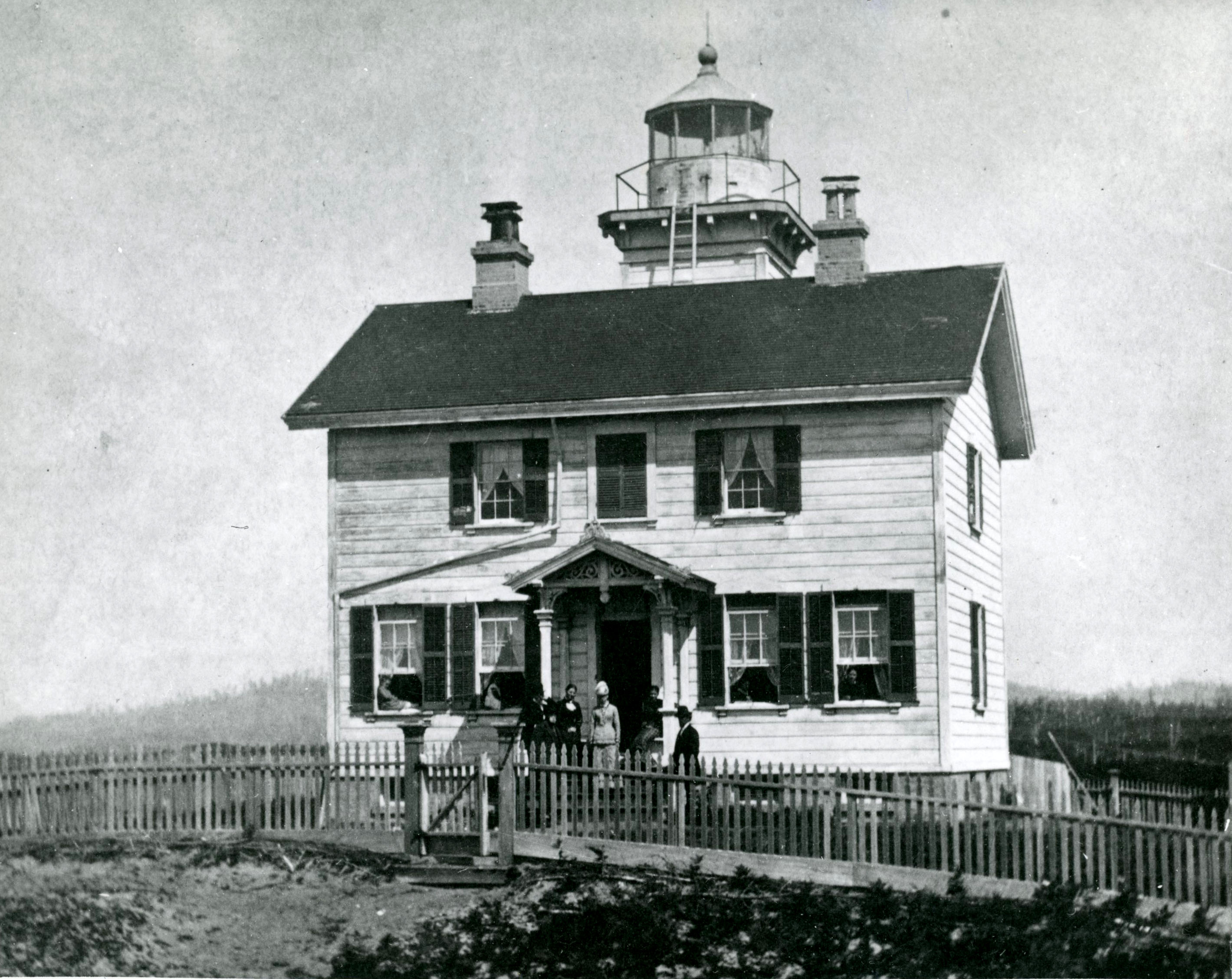Yaquina Bay, an estuary on the central Oregon Coast, was once home to the famed Olympia oyster. The two-and-a-half to three-inch delicacies, prized by the Yaquina people and later by non-Native aficionados, ignited a brief but decisive war on Yaquina Bay over who had the right to harvest the bivalves.
In 1855, Congress set aside the Coast Reservation, where coastal tribes were forcibly settled or resettled. The reservation, which stretched from Cape Lookout south to nearly the mouth of the Umpqua River, included Yaquina Bay. But in 1864, J. W. Perit Huntington, the Oregon superintendent of Indian Affairs, reported to his superiors that EuroAmericans had found Yaquina Bay to be navigable. A wagon road from the Willamette Valley to the bay had been “partially opened by citizens,” he reported, and a group of men had hacked a passable wagon road to the bay from Corvallis.
Agricultural interests in Linn, Benton, and Lane Counties hoped to use the bay to ship their products. “But in order to make the bay navigable,” Huntington reported, “it is necessary not only that the free navigation of it should be granted, but that sufficient land for building purposes and the right of way, from the head of tide-water to the eastern boundary of the reservation, should be given.” Huntington also explained that American explorers and settlers had discovered valuable oyster beds in the bay, something the Yaquina had always known. EuroAmerican settlers made applications to locate on the bay, erect buildings, and harvest and trade oysters.
The California-based Winant & Company was probably the first commercial interest to begin harvesting Yaquina Bay oysters. Founded in 1851, the dealer bought and then resold Yaquina Bay oysters in San Francisco. Captain Solomon Dodge, a company agent, established the small settlement of Oysterville on Yaquina Bay in 1863, which was focused on oyster harvesting. Corporal Royal A. Bensell of Fort Hoskins described Oysterville as "built on the steep side of a very high bluff, indeed it seems to be clinging to the mountain side....The shore is lined with floats and boats, and these floats are crowded" with Native women "culling" oysters.
In a move calculated to limit further EuroAmerican encroachment on the reservation, Ben Simpson, Indian agent for the Siletz Reservation at Yaquina Bay (1862–1870), granted an exclusive oyster-harvesting permit to two Winant & Company men in December 1863—Captain Dodge, owner of the sloop Fanny, and Captain J. J. Winant, the company’s owner who sailed the sloop Annie G. Doyle. For a fee of $1,000 (about $21,350 in 2020 dollars), Winant & Company received an exclusive oyster-harvesting permit from the federal government. The permit allowed Winant and Dodge to pay fifteen cents per bushel of oysters to the reservation and a dollar per bushel to Native oystermen and women. Reselling the oysters at ten dollars per bushel to San Francisco restaurants, Winant and Dodge managed a good profit, and by 1864 Winant & Company had opened a general store on Yaquina Bay.
Nevertheless, encroachments and competition for the oyster trade continued to escalate and finally came to a head. In 1863, Ludlow & Company of San Francisco sent Richard Hillyer, captain of the Cornelia Terry, to Yaquina Bay to harvest its own supply of oysters, claiming that as an American company it had the right to fish in American waters without a fee. Agent Simpson complained to Huntington that Hillyer had violated the rights of Winant & Company, the contractor with an approved federal permit, as well as those of the Natives living at Siletz. As Huntington wrote in his annual report for 1864, “Captain Hillyer has been for more than a year and a half engaged in repeated and pertinacious attempts to evade and defy the authority of the department, by engaging in trade, erecting houses, taking oysters, tampering with Indians.”
Simpson notified the U.S. Army of Hillyer’s actions, and Lieutenant Herzer of Fort Hoskins was ordered to arrest him. The fort, located about nineteen miles northwest of Corvallis, had been established to provide a military presence for the Coast Reservation. Herzer detailed Corporal Bensell, with several men, to Yaquina Bay on February 22 to stop the depredations. “I visited Capt. Hillyer…and forbid further shipment of oysters,” Bensell wrote in his diary. “Was treated very gentlemanly, even kindly. Should they persist, I am authorized to use force and arrest Captain Hillyer.” Despite the “gentlemanly” treatment, Hillyer had a plan. Bensell learned that Hillyer proposed to dose Bensell and his soldiers with enough laudanum to put them to sleep so he could load the oysters and set sail for San Francisco.
The next morning, Hillyer loaded the oysters onto the ship, even though he saw that Bensell’s detachment had not been drugged as planned. He warned the soldiers off, but Bensell arrested him and unloaded the oysters when Hillyer attempted to weigh anchor. He then ejected Hillyer from the reservation. But Hillyer telegraphed Commanding General George Wright in San Francisco to gain release. The general obligingly ordered Hillyer’s release, telling him to “not interfere with persons engaged in legitimate traffic” again. Once Wright learned the facts of Hillyer’s oyster piracy on the reservation, he countermanded his order, but it was too late. Hillyer had loaded his vessel with oysters and sailed for San Francisco.
In March 1864, Ludlow & Company filed a $15,000 lawsuit in Benton County Circuit Court against Simpson and Bensell for interfering in its legitimate business and arguing that Yaquina Bay was “outside” the reservation. While the case was pending, Hillyer returned to Yaquina Bay with a crew of fifteen armed roughnecks poised to remove oysters from the bay without payment to the federal government. Simpson summoned the army a second time, and Winant helped bring the standoff to a close. Hillyer and his men beat a hasty retreat.
Judge Riley E. Stratton dismissed the Ludlow & Company lawsuit in November 1864. The court held that as the government had the right to set up the reservation, it also had the right to police interlopers from taking its resources. The charges against Simpson were dropped, and Ludlow & Company was barred from Yaquina Bay until recompense was made to the Agency. The Oregon Supreme Court rejected the company’s appeal and ordered Hillyer and Ludlow & Company to pay the government’s legal costs.
The conflict over Yaquina Bay’s oysters ended when Congress opened a twenty-mile strip of the Coast Reservation, including Yaquina Bay, to settlement in 1866. Olympia oysters, overharvested in Yaquina Bay and other Oregon bays during the late nineteenth century, were nearly extirpated. Restoration efforts began in the early twenty-first century on several Oregon estuaries, and the Confederated Tribes of Siletz Indians, the Wetlands Conservancy, and Oregon Oyster Farms began collaborating in 2018 at Poole Slough in Lower Yaquina Bay to restore the oysters’ habitat.
-
![Looking west upon Newport bayfront and Yaquina Bay harbor entrance, 1910s.]()
Newport, Yaquina Bay, 1910.
Looking west upon Newport bayfront and Yaquina Bay harbor entrance, 1910s. Photo A.L. Thomas, Oreg. State Univ. Archives, A 99.47.4 N 2359
-
![]()
Olympia oysters.
Courtesy Northwest Climate Adaptation Science Center, University of Washington
-
![]()
Harvesters with scows full of oysters.
Courtesy Oregon Hist. Soc. Research Library
Related Entries
-
![Alsea Subagency of Siletz Reservation]()
Alsea Subagency of Siletz Reservation
In September 1856, Joel Palmer, the Superintendent of Indian Affairs fo…
-
Coast Indian Reservation
Beginning in 1853, Superintendent of Indian Affairs Joel Palmer negotia…
-
![Dan and Louis Oyster Bar]()
Dan and Louis Oyster Bar
Dan and Louis Oyster Bar is a family-owned seafood restaurant that has …
-
![Yaquina Bay Lighthouse]()
Yaquina Bay Lighthouse
Yaquina Bay Lighthouse, built in 1871, is currently the only wooden lig…
Related Historical Records
Map This on the Oregon History WayFinder
The Oregon History Wayfinder is an interactive map that identifies significant places, people, and events in Oregon history.
Further Reading
Bensell, Royal A. All Quiet on the Yamhill: The Civil War in Oregon; the journal of Corporal Royal A. Bensell. Eugene: University of Oregon Books, 1959.
Huntington, J. W. Perit, Superintendent of Indian Affairs for Oregon, to W. P. Dole, September 26, 1864, in Annual Report of the Commissioner of Indian Affairs, for the Year 1864. Washington, D.C.: Government Printing Office, 1865, 81-84.
Ludlow & Co. v. Benjamin Simpson, ___ Benslay and J. W. P. Huntington. Benton County Circuit Court, March 11, 1864. Transcript in Siletz Archival Collection.
Marshall, Don. Oregon Shipwrecks. Portland, OR: Binford & Mort, 1984.
Muldoon, Katy. “Oregon’s Only Native Oyster, the Olympia, Makes a Comeback after Near Extinction.” Portland Oregonian, OregonLive, July 20, 2013. https://www.oregonlive.com/environment/2013/07/oregons_only_native_oyster_the.html.
O’Donnell, Mike. The First Hundred Years: Lincoln County, 1893-1993. Newport, OR: News-Times.
“Oyster.” The Wetlands Conservancy. https://wetlandsconservancy.org/oyster/.
Simpson, Ben. Letter to Winant and Co. granting exclusive oyster harvesting permit. .December 1, 1863. M2 Roll 30, Doc. 25, Siletz Archival Collection.
Wilkinson, Charles. The People are Dancing Again: The History of the Siletz Tribe of Western Oregon. Seattle: University of Washington Press, 2010.







